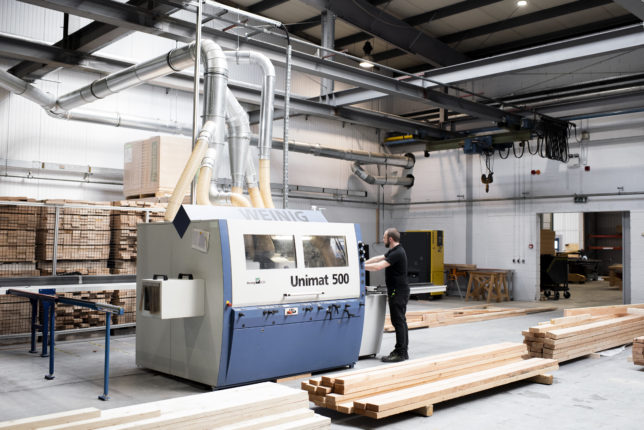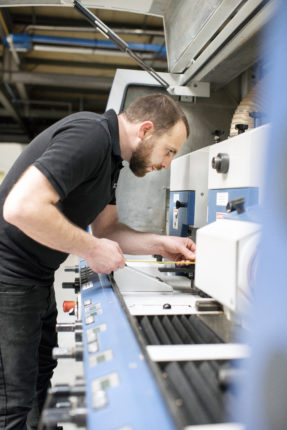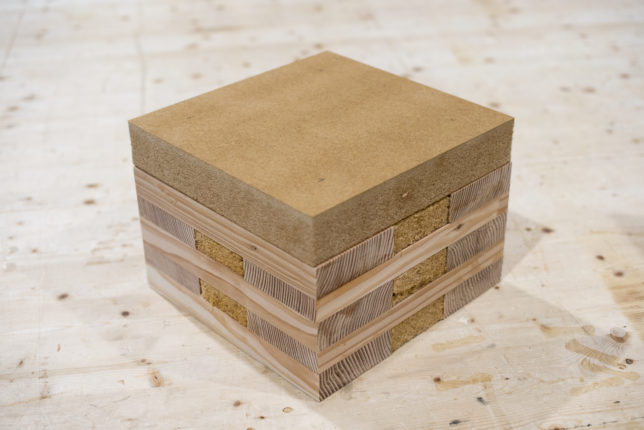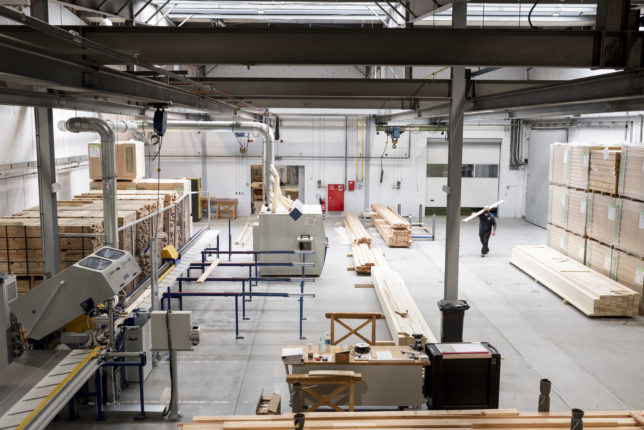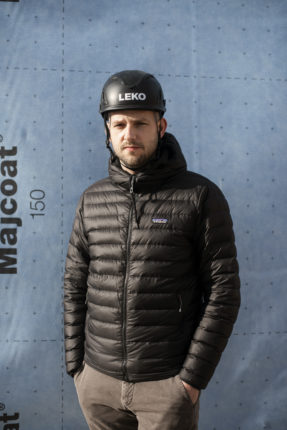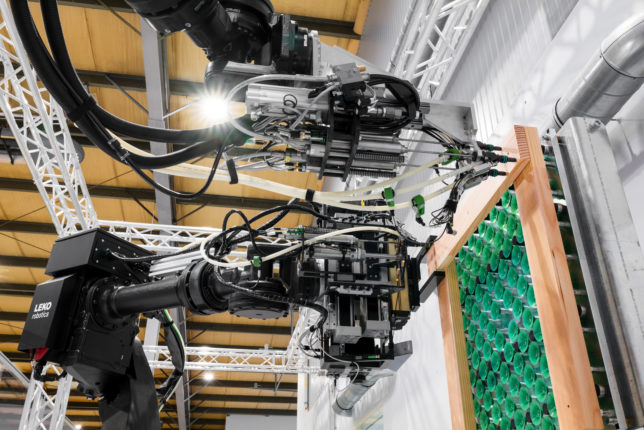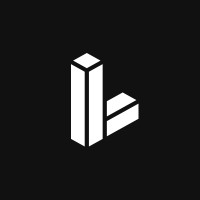LEKO is a company active in the construction sector; it offers sustainable housing solutions for real-estate developers. We visit LEKO’s headquarter in Technoport Foetz. Mr Cordier, the company’s CEO, welcomes us on this sunny but still cold afternoon in mid-March. As we enter the building, nothing in this company reminds us of the construction sector. The start-up manufactures wooden, prefabricated and tailor-made parts for houses, condominiums and other buildings.
Compared to the typical construction site, the manufacturing halls of LEKO almost seem like clean rooms. White light floods the space, and the floors are spotless. Everything seems to have a dedicated space. An enjoyable smell of freshly cut wood is in the air. One hall features a lean CNC wood cutting machine. The next is fitted with two robots for automotive assembly; in the last hall, a prefabricated wall is being finished by three workers. The office space is separated from manufacturing by a long window overlooking some of the manufacturing space. We can see 3-D models and coding on the screens – all in all, a compact-sized company.
LEKO is not a traditional construction company nor created hastily to surf on Luxembourg’s booming real-estate market. Mr Cordier, a sharp and well-thought, Generation-Y entrepreneur, founded the company in 2017 in Luxembourg. He is showing us around in his factory. His head is shaved, he is wearing a black mask and a black anorak from an outdoor-adventure brand, wrinkled pants and a pair of black sneakers. Mr Cordier would perfectly blend-in as a Silicon Valley high-tech entrepreneur; he is a rather unusual appearance in the local construction sector. But as we listen to his vision of LEKO, our image of that high-tech entrepreneur confirms. He seeks to disrupt the construction industry with a radically new approach in timber construction. The vision is to accelerate the global transition towards sustainable housing. Thus, LEKO’s mission is not merely manufacturing prefabricated wooden elements to construct more environmentally friendly, carbon positive and fully recyclable homes. Instead, it seeks to offer real-estate developers a highly profitable and sustainable alternative to traditional masonry.
« It is LEKO’s vision to accelerate the global transition towards sustainable housing. »
A disruptive value proposition based on digitalization and automatization
Striving towards such a bold vision means challenging traditional beliefs and concepts of the construction and wood construction sectors. To do so, Mr Cordier sought inspiration from other industries. « I believe that structural engineering in the residential building sector is outdated, » he says, « we need to get away from massive construction towards higher degrees of material efficiency and sophistication such as in the automotive and aerospace industry ». Along with this thought, LEKO also critically analyses aspects beyond civil engineering and building materials. Instead, it aims to disrupt traditional beliefs and approaches throughout the whole process of wood construction, starting from the design and conception of buildings to sourcing raw materials, prefabricating the elements, transporting them on site and the final assembly.
To rethink the construction sector, the company is hiring people with very diverse backgrounds and experiences. The international team includes today 30 people with 15 nationalities boasting expertise in robotics, advanced materials, design, software development, production- and mechanical engineering. They come from the automotive or aerospace industries and academic research. The multidisciplinary team does not seem to leave a stone unturned in their quest to innovate, and their results are significant. Today the young company can already rely on seven international patents. The company’s major value propositions are based on those patents. They bring high-tech, digitalization and automatization into the traditional construction sector.
The company developed software that translates an architect’s digital plans into a LEKO assembly system in a matter of minutes. The software that uses machine learning calculates the optimal quantity of wood material for each wall to fulfil the architect’s specifications,
the building’s static requirements, and its energetic constraints. The software creates digital models for each of the building’s walls. A computer sends those models to an automated production line, where the wooden parts are first CNC cut and then assembled by robots to form the walls. Those three basic steps all occur in a manufacturing setting with a size of less than 2000 square meters. Mr Cordier speaks of the scalable micro-factory concept with an envisioned final capacity of up to 500 buildings per year and a minimalistic labour deployment. Those small factories shall be installed in locations that optimize proximity to raw material sources and customer’s construction sites to keep stocks low and avoid long transport routes.
The small factory concept’s proximity coupled with the all-digital and automatization production allows running a just-in-time, build-to-order business with a relatively low cash intensity and optimized costs. Mr Cordier is aware that his bold vision about accelerating sustainable housing can only become a reality if it is profitable and, at the same time, attractive for customers. So LEKO also worked on attractive value propositions for real-estate developers, its leading target group. LEKO offers two other value propositions beyond substituting carbon-intensive building materials with sustainable and circular ones. First, houses built with LEKO elements can be built and completed in half the time of traditional houses. For real-estate developers, this means a faster return on investments. Second, LEKO’s prefabricated elements are designed to reduce the walls’ thickness by around 40% compared to traditional concrete walls with comparable static and energetic properties. Reduced walls thickness yields in higher dwelling surface areas and directly translated into higher profitability for the real-estate developer. Compared to traditional construction techniques, the LEKO systems gain around 10% more dwelling surface area from the same construction area.
The sky is the limit
In 2018, the start-up assembled its first prototype house in Sandweiler. Since, it has been able to acquire contracts to build in Mondercange, Foetz and Hassel. Currently, the order situation looks good with already three significant projects for 2021.
Thanks to its innovative concept, the company has secured funds via a local bank and the European investment bank’s InnovFin program. This program supports financing innovative projects by providing a bank guarantee of up to 50% of the investment. Mr. Cordier’s current priority is to finalize the pilot plant in Foetz and scale it to full capacity. It is the critical step the company needs to reach; after that, the sky is the limit.
